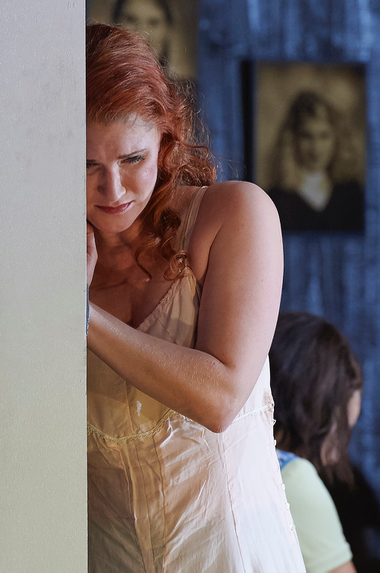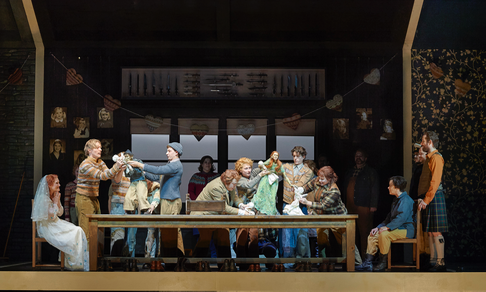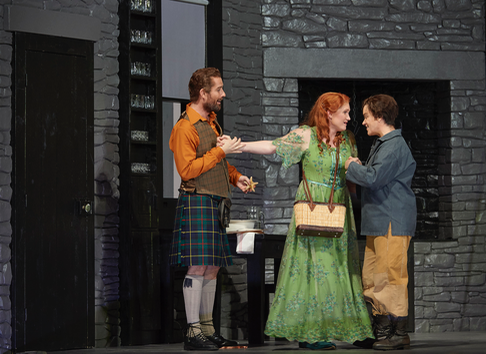
26 Oct 2016
COC’d Up Ariodante
Director Richard Jones never met an opera he couldn’t ‘change,’ and Canadian Opera Company’s sumptuously sung Ariodante was a case in point.
English Touring Opera are delighted to announce a season of lyric monodramas to tour nationally from October to December. The season features music for solo singer and piano by Argento, Britten, Tippett and Shostakovich with a bold and inventive approach to making opera during social distancing.
This tenth of ten Live from London concerts was in fact a recorded live performance from California. It was no less enjoyable for that, and it was also uplifting to learn that this wasn’t in fact the ‘last’ LfL event that we will be able to enjoy, courtesy of VOCES8 and their fellow vocal ensembles (more below …).
Ever since Wigmore Hall announced their superb series of autumn concerts, all streamed live and available free of charge, I’d been looking forward to this song recital by Ian Bostridge and Imogen Cooper.
The Sixteen continues its exploration of Henry Purcell’s Welcome Songs for Charles II. As with Robert King’s pioneering Purcell series begun over thirty years ago for Hyperion, Harry Christophers is recording two Welcome Songs per disc.
Although Stile Antico’s programme article for their Live from London recital introduced their selection from the many treasures of the English Renaissance in the context of the theological debates and upheavals of the Tudor and Elizabethan years, their performance was more evocative of private chamber music than of public liturgy.
In February this year, Albanian soprano Ermonela Jaho made a highly lauded debut recital at Wigmore Hall - a concert which both celebrated Opera Rara’s 50th anniversary and honoured the career of the Italian soprano Rosina Storchio (1872-1945), the star of verismo who created the title roles in Leoncavallo’s La bohème and Zazà, Mascagni’s Lodoletta and Puccini’s Madama Butterfly.
Evidently, face masks don’t stifle appreciative “Bravo!”s. And, reducing audience numbers doesn’t lower the volume of such acclamations. For, the audience at Wigmore Hall gave soprano Elizabeth Llewellyn and pianist Simon Lepper a greatly deserved warm reception and hearty response following this lunchtime recital of late-Romantic song.
Collapsology. Or, perhaps we should use the French word ‘Collapsologie’ because this is a transdisciplinary idea pretty much advocated by a series of French theorists - and apparently, mostly French theorists. It in essence focuses on the imminent collapse of modern society and all its layers - a series of escalating crises on a global scale: environmental, economic, geopolitical, governmental; the list is extensive.
For this week’s Live from London vocal recital we moved from the home of VOCES8, St Anne and St Agnes in the City of London, to Kings Place, where The Sixteen - who have been associate artists at the venue for some time - presented a programme of music and words bound together by the theme of ‘reflection’.
'Such is your divine Disposation that both you excellently understand, and royally entertaine the Exercise of Musicke.’
Amongst an avalanche of new Mahler recordings appearing at the moment (Das Lied von der Erde seems to be the most favoured, with three) this 1991 Mahler Second from the 2nd Kassel MahlerFest is one of the more interesting releases.
‘And there was war in heaven: Michael and his angels fought against the dragon; and the dragon fought and his angels, And prevailed not; neither was their place found any more in heaven … that old serpent … Satan, which deceiveth the whole world: he was cast out into the earth, and his angels were cast out with him.’
If there is one myth, it seems believed by some people today, that probably needs shattering it is that post-war recordings or performances of Wagner operas were always of exceptional quality. This 1949 Hamburg Tristan und Isolde is one of those recordings - though quite who is to blame for its many problems takes quite some unearthing.
There was never any doubt that the fifth of the twelve Met Stars Live in Concert broadcasts was going to be a palpably intense and vivid event, as well as a musically stunning and theatrically enervating experience.
‘Love’ was the theme for this Live from London performance by Apollo5. Given the complexity and diversity of that human emotion, and Apollo5’s reputation for versatility and diverse repertoire, ranging from Renaissance choral music to jazz, from contemporary classical works to popular song, it was no surprise that their programme spanned 500 years and several musical styles.
The Academy of St Martin in the Fields have titled their autumn series of eight concerts - which are taking place at 5pm and 7.30pm on two Saturdays each month at their home venue in Trafalgar Square, and being filmed for streaming the following Thursday - ‘re:connect’.
The London Symphony Orchestra opened their Autumn 2020 season with a homage to Oliver Knussen, who died at the age of 66 in July 2018. The programme traced a national musical lineage through the twentieth century, from Britten to Knussen, on to Mark-Anthony Turnage, and entwining the LSO and Rattle too.
With the Live from London digital vocal festival entering the second half of the series, the festival’s host, VOCES8, returned to their home at St Annes and St Agnes in the City of London to present a sequence of ‘Choral Dances’ - vocal music inspired by dance, embracing diverse genres from the Renaissance madrigal to swing jazz.
Just a few unison string wriggles from the opening of Mozart’s overture to Le nozze di Figaro are enough to make any opera-lover perch on the edge of their seat, in excited anticipation of the drama in music to come, so there could be no other curtain-raiser for this Gala Concert at the Royal Opera House, the latest instalment from ‘their House’ to ‘our houses’.
"Before the ending of the day, creator of all things, we pray that, with your accustomed mercy, you may watch over us."

Director Richard Jones never met an opera he couldn’t ‘change,’ and Canadian Opera Company’s sumptuously sung Ariodante was a case in point.
Mr. Jones and team have taken the courtly setting of the piece Handel wrote and displaced it from a medieval palace to a remote 1960’s Scottish island ”kingdom.” And although the King is still a character, the updated “realm” consists of a massive, unattractive setting that is one large part community meeting hall and one small part private residence. Well, “residence” in the sense that Ginerva’s bedroom and a cramped, ill-used “foyer” were all that were seen other than the rather primitive common room.
From the numbingly ugly bedroom wallpaper, to the floating doorknobs that open/close non-existent “doors,” to the confusing configuration of entrances, this was a depressing, intentionally dull atmosphere, meant to convey a mandated routine and an oppressive societal structure. Set designer ULTZ was also responsible for the drab, purposefully provincial costumes. The attire was at times confusing (chorus women were dressed as men but danced as women), at best functional (such as the wedding gown that gets passed around), and at worst, defeating (the titular prince looks like a hang-dog village simpleton). Although the whole dwelling was covered with a realistic ceiling which prevented down-lighting, Mimi Jordan Sherin provided an admirable lighting design that featured evenly produced washes and meaningful area illumination.
So what was this concept all about? Some program ink was taken up justifying Ginerva as the main focus (Handel be damned), pursuing a rather heavy-handed subtext that she is forced into assuming the limiting woman’s role that society demands of her. To that end, Duke Polinesso was repurposed as a hypocritical evangelist who is in actuality an unrestrained sexual predator. More program notes expounded about Ibsen and Strindberg as some sort of inspiration for this interpretation, but that was not born out by inconsistent staging choices.
The ensemble (singing well under Sandra Horst’s tutelage) was treated more like a Greek chorus than anything those Scandinavian writers might have inspired. Often (make that “too often”) the chorus would enter or exit in single file, as if in some unspoken ritual that involved moving the wooded chairs on, off, and around stage like a poor man’s bus-and-truck tour of Grand Hotel. When they tired of that, they moved the heavy table to and fro. And characters certainly did not behave realistically, clambering over, on and under furniture as they ignored each other and sought merely to create different visual levels.
Characters that were said to be “asleep” had their eyes wide open, those said to be “kneeling” were standing, those hailed as being “together” were apart, well, you get the idea. Just like in a slam-bang, authentic Hedda Gabler, right? You can only stage against the text so many times before an audience tunes out. As if this weren’t enough, puppets were added to comment on the action at the ends of each act.
 A scene with puppets
A scene with puppets
Without meaning to insult anyone’s appeal in any way, it is telling that the puppets are actually more engaging than the live singers. The marionette enactment of marriage and family life at the end of One was a breath of delightful whimsy. But then came the thudding scenario at the end of Two in which mini-“Ginerva” was tarted up as a red-pumped, street-walking pole dancer. I am not making this up. The show ended with an Instant Replay of the end of One’s marital bliss, except with the real Ginerva packing a suitcase and leaving: the scene, the set, the show. The actress walked down off the raised set onto the front apron (unobserved by anyone else on stage), and made some odd gesture(s) as if to tell the follow-spot operator to kill her light. What ‘that’ meant prompted much discussion as patrons exited the theatre. No one in earshot understood it, but then I am not sure “understanding” Ariodante was what this staging was about. Talking about it was enough.
I will say that taken on its own terms, it was all of a piece. Within its dramatic suppositions, character relationships were clear, the plot was clear enough, and given the highly accomplished musical execution, the oddities were mostly forgivable even as they were often unhelpful. The completely unsavory take on Polinesso did neither the show nor the cross-dressing performer any favors. We should have a love-hate relationship with this character, but there was such an “ick” factor in the brutal rape scene that it was impossible to connect with the talented singer. Sigh.
 Johannes Weisser as the King of Scotland, Jane Archibald as Ginevra, Alice Coote as Ariodante,
Johannes Weisser as the King of Scotland, Jane Archibald as Ginevra, Alice Coote as Ariodante,
Which returns us now to “sumptuously sung.” COC has spared no effort in assembling a veritable Dream Team of Handelians to sweep almost all of this before it. Alice Coote is at the top her considerable game in the title role, with every perfectly judged phrase confirming the impression that she has few (any?) equals in this Fach. Not only does Ms. Coote have a ripe, rich tone, but she also negotiates page after page of ungodly rapid coloratura with trip hammer accuracy. In addition to the fire, sass and brass she brings to such explosive passages, this talented artist can turn on a dime and offer limpid, affecting, introspective stretches of poised, hushed beauty.
I first encountered the equally thrilling soprano Jane Archibald in Semele with this same company, and as jaw-dropping as was that performance, she has only grown even finer in the interim. As Ginevra, Ms. Archibald summons a luxuriant tone, an unerring technique, and a compelling delivery to prove every inch a match for her Ariodante. When Alice and Jane duet late in the show, their almost mystic melismas tumbling over each other in haunting beauty, you got the impression this perfection was not meant merely for human ears.
In the trouser role of Polinesso, Varduhi Abrahamyan sported a creamy, responsive mezzo that was enormously pleasing, and admirably agile. Ms. Abrahamyan sang splendidly and went through the directed motions of sexual aggression with consistent commitment. Pity that her very real vocal achievement got eclipsed by a repugnant character concept. I will dearly look forward to encountering this wonderful singer in a happier situation. Dalinda was embodied by the assured soprano Ambur Braid portraying an endearing character, in this case made more sympathetic by the “concept.” Her subservient, sometimes cowering demeanor drew us in, and was well complemented by her secure, idiomatic singing. Impressive throughout, she was especially potent as she unleashed any number of gleaming phrases at full throttle.
At first, the role of Lurcanio seems like an after thought, even as winningly sung by Owen McCausland. Mr. McCausland made a good impression in his first aria, sharing a mellow, well-modulated tenor, albeit with a hint or two of strain at the very top. As the performance progressed, everything settled into place as he went from strength to strength, and assumed a progressively more integral role in the story. Young Aaron Sheppard had few lines as Odoardo, but served notice that his is a talent of good promise.
Among this roster of exceptional, almost exclusively Canadian principals, Norwegian Johannes Weisser was the King of Scotland. Mr. Weisser’s melismas were accurate enough, to be sure, but his bass is decidedly on the dry side, and he simply lacked the warm gravitas that would benefit the role.
Music Director Johannes Debus was conducting his first Handel but you would never have known it, given his total command of the style and his embrace of the dramatic possibilities. Maestro Debus proved to be a meticulous partner, not only with the accomplished singers but also with the dramatic intent of the composer and yes, even the director. His pacing of the evening was miraculous, making a long score fly by with a vibrant, informed reading.
Given the realities of having to produce popular bread-and-butter titles, COC is to be commended for not only programming this less accessible Handel opus, but then also challenging its patrons further with such a gritty re-interpretation. It is to the great credit of all concerned that the rapt audience willingly embraced the journey.
James Sohre
Cast and production information:
Ariodante: Alice Coote; Ginerva: Jane Archibald; Dalinda: Ambur Braid; Polinesso: Varduhi Abrahamyan; Lurcanio: Owen McCausland; King of Scotland: Johannes Weisser; Odoardo: Aaron Sheppard; Conductor: Johannes Debus; Director: Richard Jones; Set and Costume design: ULTZ; Lighting Design: Mimi Jordan Sherin; Choreographer: Lucy Burge; Puppetry Director and Design: Finn Caldwell; Chorus Master: Sandra Horst